As I have not yet decided on April's book yet I thought I would write about March's book (well, books) first, maybe
something someone else has written about will inspire me? My March choice is Nella Last's diaries, published (so far) as Nella Last's War, Nella Last's Peace and Nella Last in the 1950s, which I have been listening to as audio books. Nella Last was a housewife from Barrow in Furness, married to Will who ran a joinery and shop fitting business, who wrote for
Mass Observation from 1939 until a year or two before her death in 1968. Her diary is the longest and most complete record in Mass Observation at around 12 million words and covers every aspect of her life - her marriage, her sons, Arthur and Cliff, her neighbours, friends, relations, voluntary work, housework, politics, news, her love of the Lakes and many other subjects.
 |
| Nella Last |
The first volume, dealing with the war, was of great historical interest and provided a clear picture of day to day life in wartime, the hardships, losses, absences and bombs (Barrow suffered as badly in the Blitz as London) but above all the emotional state of ordinary men and women through the war. Nella's diaries allow us to see behind the positive images of wartime propaganda to the petty arguments between tired, emotionally strained women, the fear that was so pervasive and to the huge efforts people went to in order to persevere and overcome. In many ways the war was a better time for Nella than the years beforehand, when she had had mental breakdowns in part caused by her husband, who wanted her to be at home alone with him all the time and whose own mental health was none too good. During the war she had definite reasons for being out of the house and meeting people, volunteering with the Red Cross, the WVS and for the local hospital. Notable among her war work was running a very successful Red Cross charity shop to raise money to send Red Cross parcels to POWs. In the post war years she and other women she knew desperately missed these activities and she frequently comments on how she could feel the four walls of her house closing in on her and wonders how she is going to occupy herself.
As I have already mentioned, Nella's husband was not an easy man and she is frank about her marriage, her fears and frustrations. Neither enjoyed particularly good health, from Nella's descriptions of her physical health I began to suspect that today she would probably have been diagnosed with fibromyalgia, but while Nella's response was to try to keep going and be involved in the world, her husband's was quite the opposite. This created an enormous tension between them, however, Nella does not indulge in self pity and there is nothing maudlin about the diaries. She was a woman of a great many interests, quite apart from her writing, and I particularly enjoyed hearing about the dolls and toys she made to sell for charity; her skill at sewing must have been quite something. The diaries are also punctuated with details of her housekeeping, shopping for food and the meals she was cooking. Since rationing was in force for much of the period of the diaries published so far Nella writes about the troubles of supply, fairness, quality and the need for ingenuity with meals.
Some of the finest writing comes when she is writing about her trips to the nearby Lake District, where she had grown up on her grandmother's farm. She writes lyrically of the beauty of the Lakes and of how their peace helped her and her husband. Throughout Nella's record of her relations, neighbours and friends is a delight; she has an ear for the interesting snippet of conversation. As I listened I grew genuinely fond of Nella and was very sad when the diaries ended; I am hoping there will be further books published, fingers crossed!
You can see the other books in the Year in Books
here.




